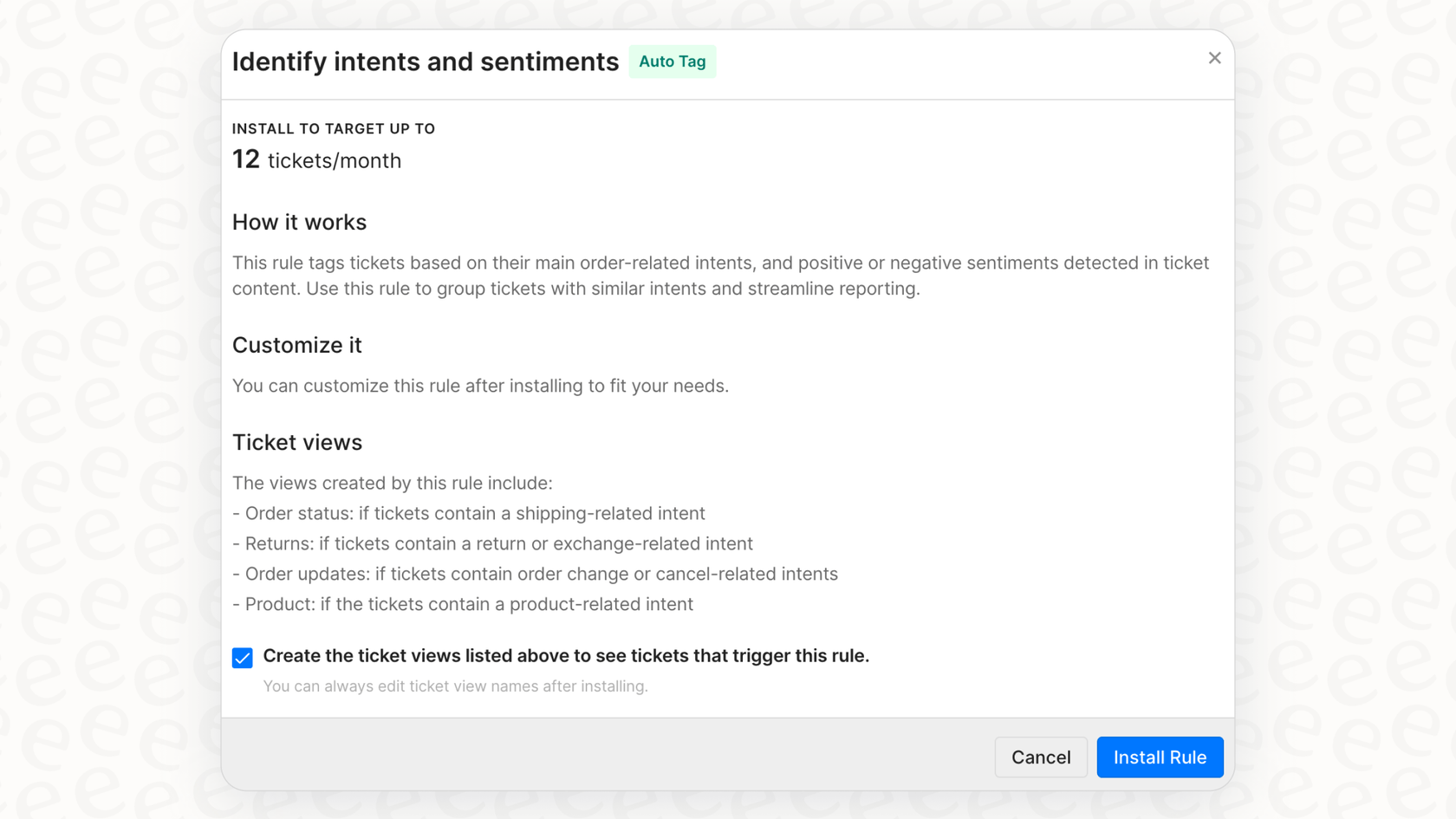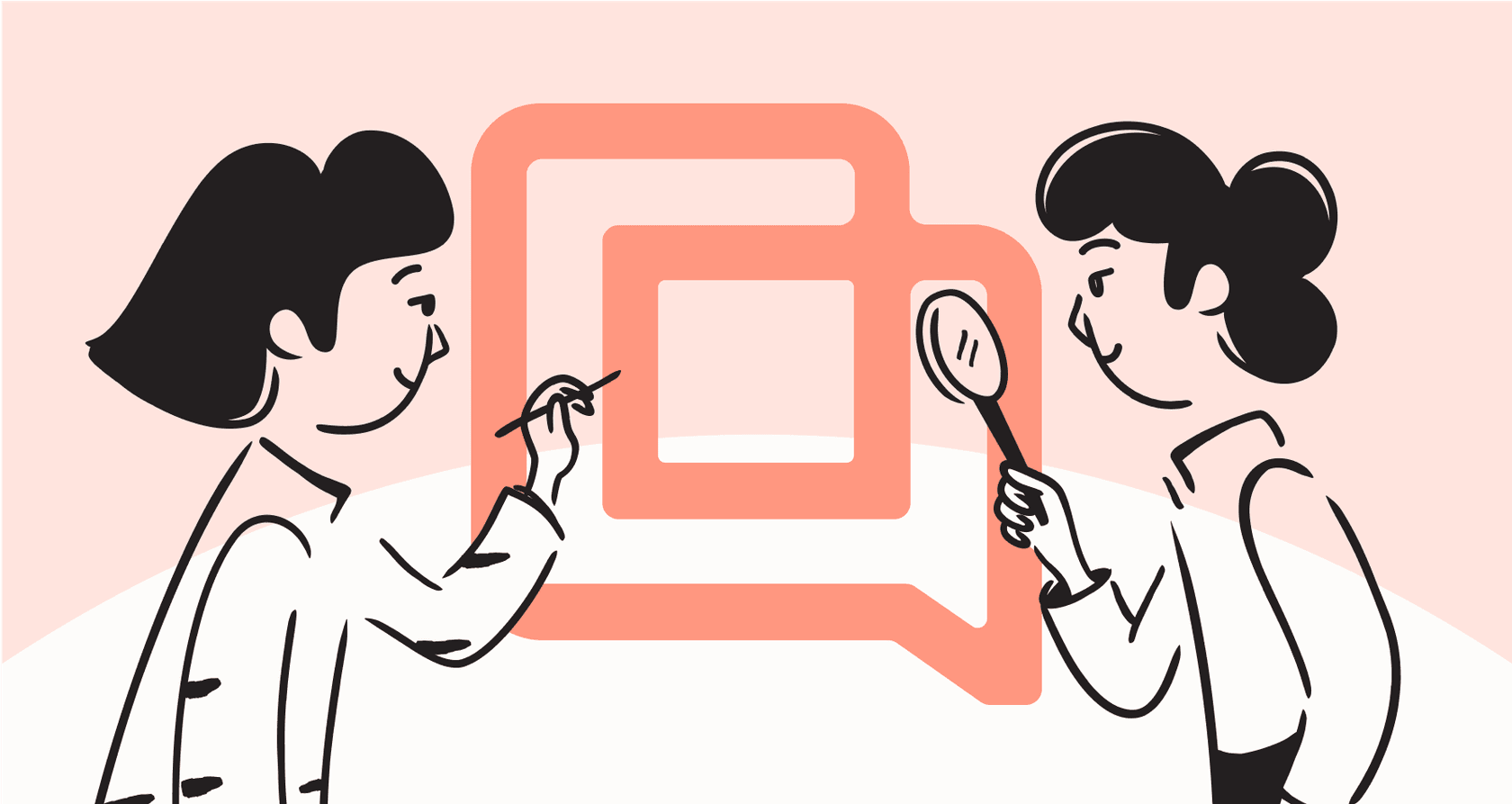Gorgias automation to tag suspected chargeback risk conversations: A 2026 guide

Stevia Putri

Katelin Teen
Last edited January 16, 2026
Expert Verified

Let's be real, chargebacks are a significant concern for any e-commerce brand. They can impact a business's bottom line and require careful management to maintain a positive reputation with payment processors. A great way to manage them is to catch and sort out those high-priority customer chats early, before they escalate.
Most businesses using Gorgias take a proactive step by setting up automation to tag tickets that mention words like "fraud" or "chargeback." This is a strong foundation for any risk management strategy. By identifying these tickets early, you can ensure they get the attention they deserve.
This guide will walk you through the built-in methods for Gorgias automation to tag suspected chargeback risk conversations, explain how to make the most of them, and show you how AI-driven tools can further enhance your revenue protection.
What is chargeback risk tagging?
Chargeback risk tagging is a system for automatically labeling customer support tickets that might require extra attention regarding a payment.
The idea is to flag these conversations so they get looked at quickly, usually by a senior agent or a team that specializes in these kinds of resolutions. When you can jump in with a helpful and understanding response, you can often solve the customer's issue and help them feel confident in your service.
In Gorgias, this is typically done with the "Rules" engine, which scans incoming messages for certain words and applies tags based on what it finds.
The standard approach: Using Gorgias rules
The out-of-the-box method in Gorgias uses reliable rules. It's a proven first step for businesses of all sizes looking to organize their workflow.
How Gorgias rules work
The setup is intuitive: you create a rule with "IF...THEN" logic. For example, a common rule might look like this:
"IF message body CONTAINS ANY OF "chargeback, dispute, fraud, unauthorized charge" THEN ADD TAG "chargeback-risk"".
This rule will automatically check every incoming message. If it spots one of those trigger words, it'll instantly add a "chargeback-risk" tag on the ticket for your team to review. It’s a clean, efficient way to stay on top of your inbox.

Scaling your rule-based automation
Keyword-based rules are an essential first line of defense. As your business grows, here are a few things to keep in mind to make them even more effective:
- Adding context: Rules work best when they focus on specific, high-intent words. To capture even more nuance, you can create multiple rules for different levels of urgency.
- Refining your tags: Gorgias allows you to be very specific with your tagging. You can differentiate between a customer asking about a policy and someone reporting a specific issue, helping your team prioritize effectively.
- Managing false alarms: Occasionally, a keyword might trigger a tag on a non-urgent ticket - such as someone reporting a phishing email they received. This is a normal part of rule-based systems, and Gorgias makes it easy for agents to manually adjust tags when needed.
- Keeping rules current: As customer language evolves, it’s a good practice to periodically review and update your keyword lists to ensure they capture the latest terminology.
A better way: Enhancing your setup with AI
Instead of only scanning for specific words, an even more comprehensive approach is to layer an AI tool on top of your Gorgias helpdesk. AI can analyze conversations for intent and sentiment, offering a high degree of accuracy.
How AI enhances the experience
Here is how AI can take your support to the next level:
- Sentiment analysis: AI can pick up on the tone of a message, identifying urgency or frustration even if the specific word "chargeback" isn't used. This allows you to flag at-risk customers even earlier in the process.
- Pattern recognition: An AI can be trained on your past ticket data to identify the subtle language and conversation flows that are unique to your brand's customer journey. It learns what your specific support needs look like.
- Automated workflows: Instead of just adding a label, AI tools can trigger a sequence of helpful actions. It can apply a "High Priority" tag, move the ticket to a specialized queue, and even use an AI Copilot to draft an empathetic response for an agent to review.
How eesel AI fits in
This is where a tool like eesel AI works beautifully as a companion to Gorgias. It plugs directly into your Gorgias helpdesk with a one-click integration, providing your team with additional AI capabilities within the platform they already use.
- Quick implementation: eesel AI is self-serve and easy to set up. You can connect Gorgias and start building workflows in minutes, allowing you to see the benefits of AI right away.
- Learns from your data: eesel AI analyzes your historical Gorgias tickets to understand your brand's unique patterns. This means it provides insights tailored specifically to your business.
- Flexible control: You decide how much you want to automate. You can start by using eesel AI to refine your tagging accuracy and eventually expand to triaging and drafting replies, all while maintaining full control over the process.
While a native Gorgias rule follows a straightforward path (Ticket -> Keyword Match? -> Tag), adding an eesel AI workflow provides more depth. It can analyze sentiment and intent to decide if a ticket needs immediate escalation, making your response even more precise.
graph TD subgraph Gorgias Rule A[Ticket Received] --> B{Keyword Match?}; B -- Yes --> C[Add 'chargeback-risk' Tag]; B -- No --> D[No Action]; end
subgraph eesel AI Workflow E[Ticket Received] --> F[AI Analysis: Sentiment, Intent, Patterns]; F -- High Risk --> G[Apply 'High Priority' Tag]; G --> H[Escalate to Senior Queue]; H --> I[Draft Empathetic Reply with AI Copilot]; F -- Low Risk --> J[No Action]; end
Pricing comparison: Gorgias and eesel AI
Gorgias offers a robust ticketing system with built-in automation, while eesel AI provides a complementary service with a different pricing structure to suit your team's needs.
Gorgias pricing
Gorgias's rule-based automation is a core part of its standard plans. These plans are designed to scale with your business based on ticket volume.
| Plan | Monthly Price | Included Tickets |
|---|---|---|
| Starter | $10 | 50 |
| Basic | $50 | 300 |
| Pro | $300 | 2,000 |
| Advanced | $750 | 5,000 |
For teams looking for full automation, the Gorgias AI Agent is an available add-on. It is priced at $0.90 to $1.00 per fully automated interaction, which is a specialized model designed for teams who want the AI to handle resolutions from start to finish.
eesel AI pricing
eesel AI offers a transparent, flat-fee model that many teams find helpful for budgeting. All features, including the AI Agent, Copilot, and Triage, are included in their plans.
| Plan | Price (Billed Annually) | AI Interactions/mo |
|---|---|---|
| Team | $239/mo | Up to 1,000 |
| Business | $639/mo | Up to 3,000 |
This model provides a clear monthly cost, making it easy to project your expenses regardless of how much your ticket volume fluctuates. eesel AI also offers flexible monthly options for teams who prefer not to use annual billing.
From reactive to proactive support
Using Gorgias automation to tag suspected chargeback risk conversations with rules is an excellent way to organize your support. It helps you stay on top of urgent messages and ensures your team can act quickly.
By layering in a dedicated AI tool like eesel AI, you can make your strategy even more proactive. With the ability to analyze sentiment and run intelligent workflows, you can enhance the way you flag, resolve, and prevent issues, protecting your bottom line while providing an even better experience for your customers.
Protect your revenue with intelligent support
Ready to take your chargeback prevention to the next level? eesel AI works hand-in-hand with Gorgias to give your team the AI-powered tools they need to identify risks and respond with care.
You can even simulate eesel AI on your past tickets to see how it can help you identify high-priority conversations faster.
Start Your Free eesel AI Trial
Frequently asked questions
Keyword-based Gorgias automation to tag suspected chargeback risk conversations is a powerful starting point. It allows you to immediately flag tickets when customers use high-intent words, helping your team prioritize urgent issues.
While rules are a solid foundation, they work best when combined with broader context. To scale effectively, many teams use rules for direct hits and layer in AI to identify more subtle indicators of risk based on tone and history.
AI uses sentiment analysis and pattern recognition to detect risk earlier and with high accuracy. It understands context beyond simple keywords, learning from your historical data to identify nuanced indicators of potential chargebacks.
Yes, by identifying at-risk conversations early, AI-powered automation allows your team to intervene proactively. Addressing customer issues quickly and empathetically can often resolve the problem before they resort to initiating a chargeback with their bank.
Gorgias offers a robust AI Agent designed for deep integration and automated resolutions within its platform. eesel AI works as a complementary tool, providing predictable, flat-fee pricing for teams looking for an additional layer of AI interaction.
eesel AI offers a one-click integration with Gorgias and is completely self-serve, allowing you to get up and running in minutes. It connects with your historical Gorgias tickets to start identifying risk patterns from day one.
A sophisticated AI tool can trigger a series of actions, such as applying "High Priority" tags, sending the ticket to a specialized queue, or even drafting an on-brand response for an agent to review. This ensures rapid and appropriate handling of high-risk cases.
Share this post

Article by
Stevia Putri
Stevia Putri is a marketing generalist at eesel AI, where she helps turn powerful AI tools into stories that resonate. She’s driven by curiosity, clarity, and the human side of technology.





